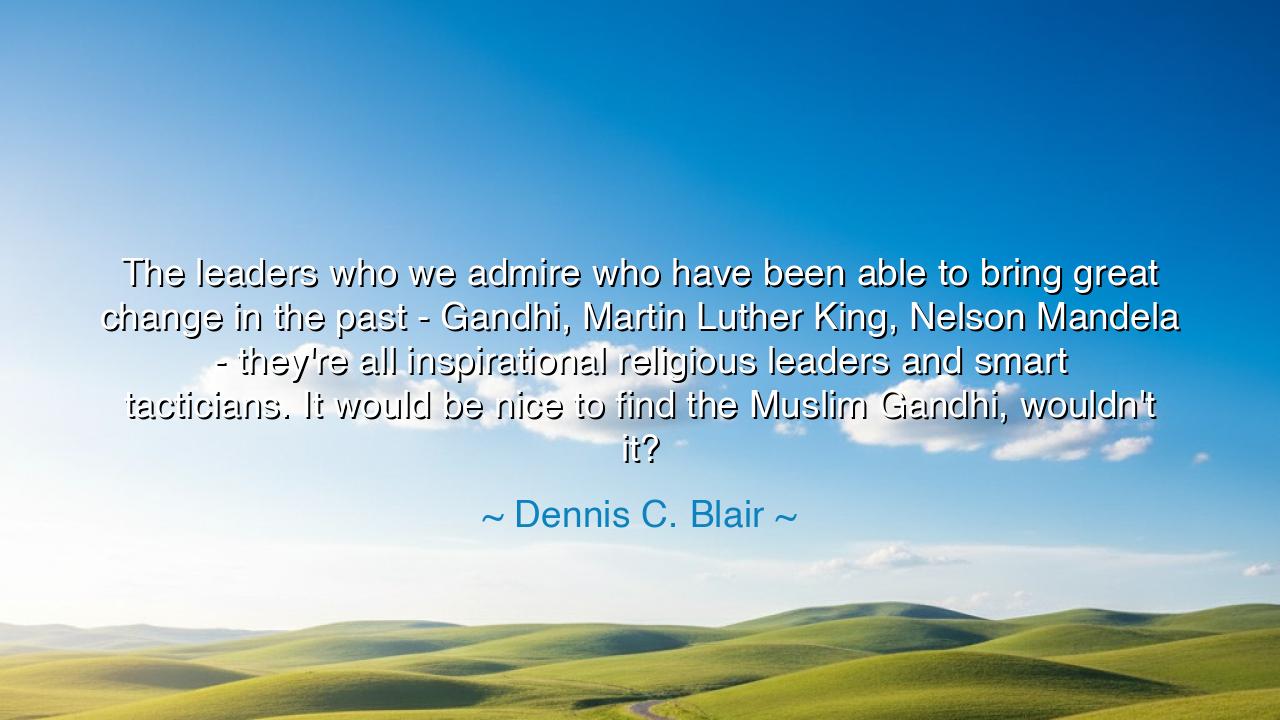
The leaders who we admire who have been able to bring great
The leaders who we admire who have been able to bring great change in the past - Gandhi, Martin Luther King, Nelson Mandela - they're all inspirational religious leaders and smart tacticians. It would be nice to find the Muslim Gandhi, wouldn't it?






In the reflective words of Dennis C. Blair, a man who has spent his life studying the delicate balance between conflict and peace, we hear both a lament and a hope: “The leaders who we admire who have been able to bring great change in the past — Gandhi, Martin Luther King, Nelson Mandela — they're all inspirational religious leaders and smart tacticians. It would be nice to find the Muslim Gandhi, wouldn't it?” Beneath these words lies a yearning as ancient as humanity itself — the longing for a voice of wisdom and compassion to rise in times of division, a voice capable of turning anger into reconciliation and conflict into creation. Blair’s thought is not a call to religion alone, but to moral leadership, the kind that transcends creed, nation, and time.
The origin of this quote springs from Blair’s deep understanding of the world’s political and moral landscape. As a former admiral and Director of National Intelligence, he saw firsthand how warfare and ideology shape the destiny of nations. Yet his reflection does not glorify power or force — it glorifies conscience. By invoking Gandhi, Martin Luther King Jr., and Nelson Mandela, he names not conquerors, but visionaries — leaders who united the spiritual and the strategic, the heart and the mind. They led revolutions not with armies, but with conviction; they conquered empires not by the sword, but by the steadfast power of truth and mercy. Blair’s yearning for a “Muslim Gandhi” is therefore a call for a new voice of peace to arise from within the world’s most misunderstood conflicts — a leader who could transform pain into purpose and division into dialogue.
To understand the depth of Blair’s words, we must look to those he names. Mahatma Gandhi was not merely a political figure; he was the embodiment of satyagraha, or the “truth-force” — the belief that love and nonviolence could disarm even the most powerful empire. Martin Luther King Jr., drawing from both Christian faith and Gandhian philosophy, turned racial injustice into a moral question that pierced the soul of a nation. Nelson Mandela, once a prisoner of apartheid, emerged not with vengeance but with forgiveness, guiding South Africa toward reconciliation rather than ruin. What unites these figures, as Blair notes, is not just their idealism but their tactical wisdom. They were not naive dreamers; they were master strategists who used faith as a foundation for political genius.
Blair’s invocation of a “Muslim Gandhi” is not a criticism of Islam, but an acknowledgment of its vast spiritual power — a faith whose teachings of peace, patience, and compassion could, if embodied in such a leader, heal wounds long left open by misunderstanding and extremism. History has seen glimpses of such figures — men like Abdul Ghaffar Khan, known as the “Frontier Gandhi,” a devout Muslim who led a nonviolent movement against British rule alongside Gandhi himself. Khan proved that Islam and nonviolence are not opposites but kindred virtues — that faith, when joined with courage, becomes a bridge between hearts. Blair’s longing, then, is not for something that does not exist, but for something that must rise again: the union of spiritual integrity and political vision in the service of humanity.
The wisdom of this quote extends beyond religion or politics — it speaks to the universal need for leadership grounded in compassion. For in every age, the world grows weary of ambition untempered by empathy, of intellect without soul. The leaders Blair names remind us that to lead is not merely to rule, but to serve, and to serve not only one’s people, but the conscience of the world. A true leader, as he describes, must be both inspirational and tactical — inspired enough to move hearts, and wise enough to shape action. Without one, leadership becomes hollow idealism; without the other, it descends into tyranny. The balance of the two creates greatness.
Let this, then, be the lesson we draw from Dennis C. Blair’s reflection: that the world’s healing will not come from those who shout the loudest or strike the hardest, but from those who understand deeply and love bravely. In every community, in every nation, there must arise men and women who embody the spirit of peace through strength, faith through reason, and hope through endurance. You need not be a Gandhi, a King, or a Mandela to begin — but you must, like them, refuse to surrender your heart to bitterness or fear. The power to lead with compassion lies within every soul that dares to see enemies as brothers and injustice as an opportunity for mercy.
And so, dear listener, remember this ancient truth made new by Blair’s words: the greatest revolutions are not fought in battlefields but in hearts. Seek to be both wise and kind, both steadfast and gentle. For one day, it may not be a “Muslim Gandhi” or any other great name that changes the world — it may be you, or someone you inspire, who brings light where darkness long reigned. The call to lead with love is eternal; and every generation must answer it anew, until the voice of peace is not rare, but common as breath itself.






AAdministratorAdministrator
Welcome, honored guests. Please leave a comment, we will respond soon